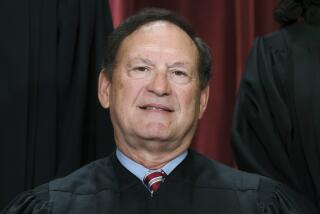Meese ‘Most Dangerous Official Since Nixon,’ ACLU Declares : Disparagement of Supreme Court Decisions Cited
- Share via
WASHINGTON — The American Civil Liberties Union charged today that Atty. Gen. Edwin Meese III “is fast establishing himself as the most dangerous public official since Richard Nixon” after he said government officials should not look on Supreme Court decisions on constitutional issues as the supreme law of the land.
The attorney general, in a speech delivered Tuesday at Tulane University in New Orleans, said that those who place judicial rulings “on a par with the Constitution” are wrong and that the Supreme Court in some cases has seemed “to equate the judge with the lawgiver.”
ACLU Executive Director Ira Glasser called Meese’s remarks “an invitation to lawlessness and a breach of constitutional duty to uphold the law.”
Meese, in his speech, said “constitutional decisions need not be seen as the last words in constitutional construction.”
“Constitutional interpretation is not the business of the court only, but also, and properly, the business of all branches of government,” he added. “Each of the three coordinate branches of government created and empowered by the Constitution . . . has a duty to interpret the Constitution in the performance of its official functions.”
Critical of 1958 Ruling
Meese criticized a 1958 ruling that contained language suggesting that the Supreme Court seemed to equate its decisions with the Constitution.
That ruling, Cooper vs. Aaron, referred to the landmark school desegregation case four years earlier, Brown vs. Board of Education, as “the supreme law of the land.”
Meese criticized the court’s view of its own powers in Cooper vs. Aaron, saying that view “was, and is, at war with the Constitution.”
He added that that interpretation is “at war with the basic principles of democratic government, and at war with the very meaning of the rule of law.”
“Obviously, the decision was binding on the parties in the case; but the implication that everyone would have to accept its judgments uncritically, that it was a decision from which there could be no appeal, was astonishing,” he said.
Speech ‘Incomplete’
He noted that the Supreme Court can and has overruled its own decisions.
John Killian, a senior specialist at the Congressional Research Service at the Library of Congress, said today that Meese’s speech is “incomplete. It inadequately addresses the situation.”
“What it doesn’t talk about is that a court decision is precedent,” Killian said. “It establishes a meaning of the provision of the Constitution, and future decisions are decided in accordance with that.”
Killian acknowledged that a Supreme Court decision, as Meese said, does not bind people who are not parties to the case, “but it does govern; like cases will be decided by other courts in a like manner.”
He said the remedy for someone who disagrees with a decision is to ask the court to overturn it, and he noted that the Supreme Court has overturned its own decisions more than 180 times.
More to Read
Sign up for Essential California
The most important California stories and recommendations in your inbox every morning.
You may occasionally receive promotional content from the Los Angeles Times.













